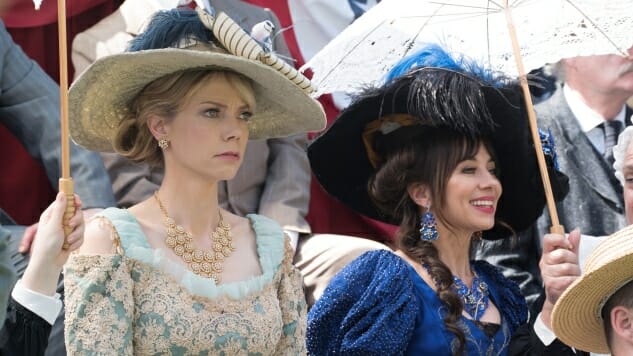Another Period Tackles White Feminism, Class Warfare and the Scrappiness of the Lower Class
Photos by Ali Goldstein, courtesy of Comedy Central
A lot has changed in America since Another Period last aired in the summer of 2016. The last time we saw Riki Lindhome and Natasha Leggero playing the shamelessly self-involved Bellacourt sisters, it still seemed likely that a woman would be president by the time the third season dropped, that reproductive rights would be protected, and that the country would move in the direction of tolerance.
Well, that didn’t happen. While this is a dubious prospect for the country, it gives this season of the Comedy Central show a lot to pull from, and fans will see Another Period’s third season pile on the satire in wilder and more inventive ways than the reality-show-set-in-the-1900s ever has before. Its core targets of ridicule—class and gender—are more relevant now than ever before in our lifetime, a reality that Lindhome and Leggero take full advantage of in their reality-show parody.
“It’s such an amazing part of American history, when America was just kind of figuring out who it was,” Lindhome told Paste of the turn-of-the-century New England setting of the Bellacourt mansion. “It’s so relevant to where we are now because I feel that we’re coming full circle and trying to figure things out again.”
In case you’ve lost the thread from last season, Another Period follows Lillian and Beatrice’s fabulous self-serving life as American “new money” royalty in Newport, Rhode Island, and their flagrant displays of narcissism. While Lindhome and Leggero remain the show’s nucleus, the rest of their world is populated with every walk of life—their servants are given nearly as much screentime along with historical figures of the era (keep your eyes peeled for Young Hitler this season), leaving the format open for unlimited commentary on class, gender, race and however many incest jokes can fit into twenty-two minutes.
This year, Another Period is exploring the feminist spectrum as it existed at the turn of the century in earnest, highlighting the disappointing ways that attitudes haven’t changed since before women could even vote. The season premiere centered on the suffragettes of the early 1900s and how Lillian and Beatrice manipulated them to serve their own sinister purposes—that is, getting more attention.
“She was going to change the lives of women everywhere,” says a suffragette in the season one premiere, speaking of the allegedly deceased Bellacourt suffragette sister Hortense.
“Who cares about that?” Lindhome’s Beatrice asks. “Only women.”
-

-

-

-

-

-

-

-

-

-

-

-

-

-

-

-

-

-

-

-

-

-

-

-

-

-

-

-

-

-

-

-

-

-

-

-

-

-

-

-








































